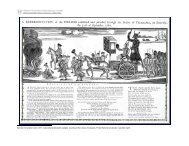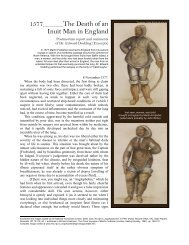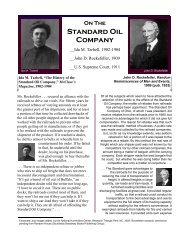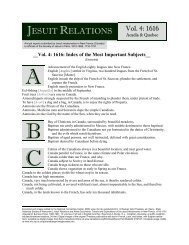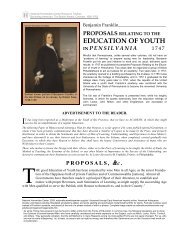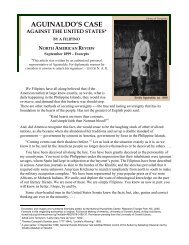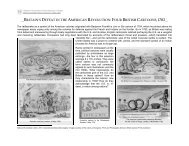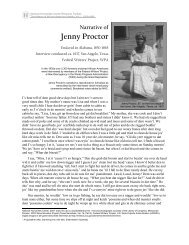Giovanni da Verrazzano, Letter to King Francis, 1524 - National ...
Giovanni da Verrazzano, Letter to King Francis, 1524 - National ...
Giovanni da Verrazzano, Letter to King Francis, 1524 - National ...
Create successful ePaper yourself
Turn your PDF publications into a flip-book with our unique Google optimized e-Paper software.
Pierpont Morgan Library<br />
<strong>Verrazzano</strong><br />
<strong>Giovanni</strong> <strong>da</strong> <strong>Verrazzano</strong><br />
_______<br />
<strong>Letter</strong> <strong>to</strong><br />
<strong>King</strong> <strong>Francis</strong> 1 of France<br />
8 July <strong>1524</strong><br />
__________<br />
reporting on his voyage<br />
<strong>to</strong> the New World *<br />
Del Viaggio del Verazzano Nobile<br />
Fiorentino al Servizio di Francesco<br />
I, Ri de Francia, fat<strong>to</strong> nel <strong>1524</strong><br />
all’America Settentrionale.<br />
____EXCERPTS____<br />
♦ <strong>Verrazzano</strong>’s marginal notes are italicized and bracketed within the text. ♦<br />
Project Gutenberg<br />
<strong>Francis</strong> I<br />
Since the s<strong>to</strong>rm that we encountered in the northern regions, Most Serene <strong>King</strong>, I have not written<br />
<strong>to</strong> tell Your Majesty of what happened <strong>to</strong> the four ships which you sent out over the Ocean <strong>to</strong><br />
explore new lands, as I thought that you had already been informed of everything ⎯ how we were<br />
forced by the fury of the winds <strong>to</strong> return in distress <strong>to</strong> Brittany with only the Normandy and the<br />
Dauphine, and that after undergoing repairs there, we began our voyage with these two ships,<br />
equipped for war, following the coasts of Spain, as Your Most Serene Majesty will have heard; and<br />
then according <strong>to</strong> our new plan, we continued the original voyage with only the Dauphine; now on<br />
our return from this voyage, I will tell Your Majesty of what we found.<br />
We set sail with the Dauphine from the deserted rock near the Island of Madeira, which belongs <strong>to</strong><br />
the Most Serene <strong>King</strong> of Portugal [at the beginning of <strong>1524</strong>], on the XVII <strong>da</strong>y of January last; we<br />
had fifty men, and were provided with food for eight months, with arms and other articles of war,<br />
and naval munitions; we sailed westward on the gentle breath of a light easterly wind. In XXV <strong>da</strong>ys<br />
we covered eight hundred leagues. On the XXIIII <strong>da</strong>y of February [for about 16 hours] we went<br />
through a s<strong>to</strong>rm as violent as ever [a] sailing man encountered. We were delivered from it with the<br />
divine help and goodness of the ship, whose glorious name and happy destiny enabled her <strong>to</strong> endure<br />
the violent waves of the sea. We continued on our westerly course, keeping rather <strong>to</strong> the north.<br />
In another XXV <strong>da</strong>ys we sailed more than four hundred leagues, where there appeared a new land<br />
which had never been seen before by any man, either ancient or modern. At first it appeared <strong>to</strong> be<br />
rather low-lying; having approached <strong>to</strong> within a quarter of a league, we realized that it was<br />
inhabited, for huge fires had been built on the seashore. We saw that the land stretched southward,<br />
and coasted along it in search of some port where we might anchor the ship and investigate the<br />
nature of the land, but in fifty leagues we found no harbor or place where we could s<strong>to</strong>p with the<br />
* Excerpted and images added by the <strong>National</strong> Humanities Center, 2006, www.nhc.rtp.nc.us/pds/pds.htm. Translated from the Italian<br />
by Susan Tarrow; in Lawrence C. Wroth, ed., The Voyages of <strong>Giovanni</strong> <strong>da</strong> <strong>Verrazzano</strong>, <strong>1524</strong>-1528 (New Haven: Published for The<br />
Pierpont Morgan Library by Yale University Press, 1970). Reproduced by permission. Some paragraphing added by NHC. Full text<br />
(translation by Joseph Cogswell) in American Journeys: Eyewitness Accounts of Early American Exploration and Settlement<br />
(Wisconsin His<strong>to</strong>rical Society) at www.americanjourneys.org/aj-094/. Complete image credits at www.nhc.rtp.nc.us/pds/amerbegin/<br />
imagecredits.htm.
M. Trump<br />
Approximate route. <strong>Verrazzano</strong> went ashore<br />
near Cape Fear in mid March <strong>1524</strong>.<br />
ship. Seeing that the land continued <strong>to</strong> the south [so as not<br />
<strong>to</strong> meet with the Spaniards], we decided <strong>to</strong> turn and skirt it<br />
<strong>to</strong>ward the north, where we found the land we had sighted<br />
earlier. So we anchored off the coast and sent the small<br />
boat in <strong>to</strong> land. We had seen many people coming <strong>to</strong> the<br />
seashore, but they fled when they saw us approaching;<br />
several times they s<strong>to</strong>pped and turned around <strong>to</strong> look at us<br />
in great wonderment. We reassured them with various<br />
signs, and some of them came up, showing great delight at<br />
seeing us and marveling at our clothes, appearance, and our<br />
whiteness; they showed us by various signs where we<br />
could most easily secure the boat, and offered us some of<br />
their food. We were on land, and I shall now tell Your<br />
Majesty briefly what we were able <strong>to</strong> learn of their life and<br />
cus<strong>to</strong>ms. 1<br />
They go completely naked except that around their loins<br />
they wear skins of small animals like martens, with a<br />
narrow belt of grass around the body, <strong>to</strong> which they tie<br />
various tails of other animals which hang down <strong>to</strong> the knees; the rest of the body is bare, and so is<br />
the head. Some of them wear garlands of birds’ feathers. They are <strong>da</strong>rk in color, not unlike the<br />
Ethiopians, with thick black hair, not very long, tied back behind the head like a small tail. As for<br />
the physique of these men, they are well proportioned, of medium height, a little taller than we are.<br />
They have broad chests, strong arms, and the legs and other parts of the body are well composed.<br />
There is nothing else, except that they tend <strong>to</strong> be rather broad in the face: but not all, for we saw<br />
many with angular faces. They have big black eyes, and an attentive and open look. They are not<br />
very strong, but they have a sharp cunning, and are agile and swift runners. From what we could tell<br />
from observation, in the last two respects they resemble the Orientals, particularly those from the<br />
farthest Sinarian regions. 2 We could not learn the details of the life and cus<strong>to</strong>ms of these people<br />
because of the short time we spent on land, due <strong>to</strong> the fact that there were few men, and the ship<br />
was anchored on the high seas.<br />
Not far from these people, we found others on the shore whose way of life we think is similar. I will<br />
now tell Your Majesty about it, and describe the situation and nature of this land. The seashore is<br />
completely covered with fine sand XV feet deep, which arises in the forms of small hills about fifty<br />
paces wide. After climbing farther, we found other streams and inlets from the sea which come in<br />
by several mouths, and follow the ins and outs of the shoreline. Nearby we could see a stretch of<br />
country much higher than the sandy shore, with many beautiful fields and plains full of great<br />
forests, some sparse and some dense; and the trees have so many colors, and are so beautiful and<br />
delightful that they defy description. And do not think, Your Majesty, that these forests are like the<br />
Hyrcanian Forest or the wild wastelands of Scythia and the northern countries, 3 full of common<br />
trees; they are adorned and clothed with palms, laurel, cypress, and other varieties of tree unknown<br />
in our Europe. And these trees emit a sweet fragrance over a large area [We smelled the fragrance a<br />
hundred leagues away, and even farther when they were burning the ce<strong>da</strong>rs and the winds were<br />
1 It may now be suggested, but not affirmed, that the landfall was not exactly at 34° on the George<strong>to</strong>wn peninsula [SC] nor at Cape<br />
Fear [NC] itself at 33° 51′, but rather in this last-named latitude on the continental coast west of Cape Fear, near the place where<br />
<strong>to</strong><strong>da</strong>y’s boun<strong>da</strong>ry line between the Carolinas reaches the sea. [Wroth, Voyages, p. 79]<br />
2 Sinarian: Chinese.<br />
3 Hyrcanian Forest: in northern Iran. Scythia: ancient region of Eurasia.<br />
<strong>National</strong> Humanities Center 2
lowing from the land.] the nature of which we could not examine for the reason stated above, not<br />
because we found it difficult <strong>to</strong> get through the forests ⎯ indeed, they are nowhere so dense as <strong>to</strong><br />
be impenetrable. We think that they belong <strong>to</strong> the Orient by virtue of the surroundings, and that they<br />
are not without some kind of narcotic or aromatic liquor. There are other riches, like gold, which<br />
ground of such a color usually denotes. There is an abun<strong>da</strong>nce of animals, stags, deer, hares; and<br />
also of lakes and pools of running water with various types of bird, perfect for all the delights and<br />
pleasures of the hunt. This land lies at 34 degrees [like Carthage and Damascus]. The air is<br />
salubrious and pure, and free from the extremes of heat and cold; gentle winds blow in these<br />
regions, and the prevailing winds in summertime, which was beginning when we were there [in<br />
those regions], are northwest and westerly; the sky is clear and cloudless, with infrequent rain, and<br />
if occasionally the south winds bring in clouds and murkiness, they are dispelled in an instant, and<br />
the sky is once more clear and bright; the sea is calm and unruffled, its waves gentle. . . .<br />
We left this place and continued <strong>to</strong> follow the coast, which we found veered <strong>to</strong> the east. All along it<br />
we saw great fires because of the numerous inhabitants; we anchored off the shore, since there was<br />
no harbor, and because we needed water we sent the<br />
Pierpont Morgan Library<br />
small boat ashore with XXV men. The sea along the<br />
coast was churned up by enormous waves because of<br />
the open beach, and so it was impossible <strong>to</strong> put<br />
anyone ashore without en<strong>da</strong>ngering the boat. We saw<br />
many people on the beach making various friendly<br />
signs, and beckoning us ashore; and there I saw a<br />
magnificent deed, as Your Majesty will hear.<br />
We sent one of our young sailors swimming ashore<br />
<strong>to</strong> take the people some trinkets, such as little bells,<br />
mirrors, and other trifles, and when he came within<br />
four fathoms of them, he threw them the goods and<br />
tried <strong>to</strong> turn back, but he was so <strong>to</strong>ssed about by the<br />
waves that he was carried up on<strong>to</strong> the beach half<br />
dead. Seeing this, the native people immediately ran<br />
up; they <strong>to</strong>ok him by the head, the legs, and arms and<br />
carried him some distance away. Whereupon the<br />
youth, realizing he was being carried away like this,<br />
was seized with terror, and began <strong>to</strong> utter loud cries.<br />
They answered him in their language <strong>to</strong> show him he<br />
should not be afraid. Then they placed him on the<br />
ground in the sun, at the foot of a small hill, and<br />
made gestures of great admiration, looking at the<br />
whiteness of his flesh and examining him from head <strong>to</strong> foot. They <strong>to</strong>ok off his shirt and shoes and<br />
hose, leaving him naked, then made a huge fire next <strong>to</strong> him, placing him near the heat. When the<br />
<strong>Verrazzano</strong>’s hand-written letter in Italian, p. 4, (inset:<br />
beginning of marginal note refering <strong>to</strong> “Annunciata,”<br />
identified as Cape Lookout in the Carolina Outer Banks)<br />
sailors in the boat saw this, they were filled with terror, as always when something new occurs, and<br />
thought the people wanted <strong>to</strong> roast him for food.<br />
After remaining with them for a while, he regained his strength, and showed them by signs that he<br />
wanted <strong>to</strong> return <strong>to</strong> the ship. With the greatest kindness, they accompanied him <strong>to</strong> the sea, holding<br />
him close and embracing him; and then <strong>to</strong> reassure him, they withdrew <strong>to</strong> a high hill and s<strong>to</strong>od<br />
watching him until he was in the boat. The youth learned the following about these people: they are<br />
<strong>da</strong>rk in color like the other [tribes], their skin is very glossy, they are of medium height, their faces<br />
<strong>National</strong> Humanities Center 3
are more clear-cut, their body and other limbs much more delicate and much less powerful, but they<br />
are more quick-witted. He saw nothing else.<br />
We left this place [We called it “Annunciata” 4 from the <strong>da</strong>y of arrival, and found there an isthmus<br />
one mile wide and about two hundred miles long, in which we could see the eastern sea from the<br />
ship, halfway between west 5 and north. This is doubtless the one which goes around the tip of India,<br />
China, and Cathay. We sailed along this isthmus, hoping all the time <strong>to</strong> find some strait <strong>to</strong> the end<br />
of 6 or real promon<strong>to</strong>ry where the land might end <strong>to</strong>ward the north, and we could reach those<br />
blessed shores of Cathay. This isthmus was named by the discoverer “Varazanio,” just as all the<br />
land we found was called “Francesca” after<br />
British Library<br />
Michael Lok, Illustri Viro, 1582, depicting the “Mare de<br />
Verrazana”<br />
“This is doubtless the one [sea] which goes<br />
around the tip of India, China, and Cathay.”<br />
<strong>Verrazzano</strong>, on the “Mare de Verrazana”<br />
4 “Annunciata”: Cape Lookout, North Carolina.<br />
5 originally “east.” [Wroth, p. 136]<br />
6 “<strong>to</strong> the end of” crossed out. [Wroth, p. 136]<br />
our <strong>Francis</strong>.] still following the coast which<br />
veered somewhat <strong>to</strong> the north, and after fifty<br />
leagues we reached another land which seemed<br />
much more beautiful and full of great forests.<br />
We anchored there, and with XX men we<br />
penetrated about two leagues inland, <strong>to</strong> find<br />
that the people had fled in terror in<strong>to</strong> the<br />
forests. Searching everywhere, we met with a<br />
very old woman and a young girl of XVIII <strong>to</strong><br />
XX years, who had hidden in the grass in fear.<br />
The old woman had two little girls whom she<br />
carried on her shoulders, and clinging <strong>to</strong> her<br />
neck a boy ⎯ they were all about eight years<br />
old. The young woman also had three children,<br />
but all girls. When we met them, they began <strong>to</strong><br />
shout. The old woman made signs <strong>to</strong> us that the<br />
men had fled <strong>to</strong> the woods. We gave her some<br />
of our food <strong>to</strong> eat, which she accepted with<br />
North Carolina Outer Banks NASA<br />
Pamlico Sound<br />
(“Mare de Verrazana”)<br />
Pamlico<br />
Sound<br />
Cape Lookout (“Annunciata”)<br />
Cape Lookout [Cape Fear <strong>to</strong> the southwest]<br />
Cape Hatteras<br />
Cape Hatteras<br />
<strong>National</strong> Humanities Center 4
Bibl. Natl. du Québec<br />
Giacomo Gastaldi, La Nuova Francia (New France), 1556. Largely based on the<br />
voyages of <strong>Verrazzano</strong> in <strong>1524</strong> and Cartier in 1535-36, this is the first printed map<br />
of present-<strong>da</strong>y New England and eastern Cana<strong>da</strong>. The yellow band may represent<br />
the Grand Banks, fished each summer by several European nations from the late<br />
1400s (and perhaps much earlier by Basque fishermen).<br />
New York harbor, “a very agreeable place,” is <strong>to</strong> the left of “Angoulesme.” Long<br />
Island is labeled as the peninsula “Flora.”<br />
great pleasure; the young woman<br />
refused everything and threw it<br />
angrily <strong>to</strong> the ground. We <strong>to</strong>ok<br />
the boy from the old woman <strong>to</strong><br />
carry back <strong>to</strong> France, and we<br />
wanted <strong>to</strong> take the young<br />
woman, who was very beautiful<br />
and tall, but it was impossible<br />
<strong>to</strong> take her <strong>to</strong> the sea because of<br />
the loud cries she uttered. And<br />
as we were a long way from the<br />
ship and had <strong>to</strong> pass through<br />
several woods, we decided <strong>to</strong><br />
leave her behind, and <strong>to</strong>ok only<br />
the boy. . . .<br />
[W]e continued <strong>to</strong> follow the<br />
coast <strong>to</strong> the northeast [which we<br />
baptized “Arcadia” on account<br />
of the beauty of the trees. In<br />
Arcadia we found a man who<br />
came <strong>to</strong> the shore <strong>to</strong> see who we<br />
were: he s<strong>to</strong>od suspiciously and<br />
ready for flight. He watched us<br />
but would not come near. He<br />
was handsome, naked, with<br />
olive-colored skin, his hair<br />
fastened back in a knot. There<br />
were about XX of us ashore, and<br />
as we coaxed him, he<br />
approached <strong>to</strong> within about two<br />
fathoms of us, and showed us a<br />
burning stick, as if <strong>to</strong> offer us<br />
fire. And we made fire with<br />
powder and flint, and he<br />
trembled all over with fear as we<br />
fired a shot. He remained as if<br />
thunderstruck, and prayed, worshiping like a monk, pointing his finger <strong>to</strong> the sky, and indicating the<br />
sea and the ship, he appeared <strong>to</strong> bless [?] us.], sailing only during the <strong>da</strong>y and casting anchor at<br />
night. [We followed a coast which was very green and forested, but without harbors, and with some<br />
pleasant promon<strong>to</strong>ries and small rivers. We baptized it the “Costa di Lorenna” after the Cardinal:<br />
the first promon<strong>to</strong>ry “Lanzone,” the second “Bonivet<strong>to</strong>,” the largest river “Vandoma,” and a little<br />
mountain by the sea, “di S. Polo” after the Count.] 7 After a hundred leagues we found a very<br />
agreeable place 8 between two small but prominent hills; between them a very wide river, deep at its<br />
mouth, flowed out in<strong>to</strong> the sea; and with the help of the tide, which rises eight feet, any laden ship<br />
7 “Lanzone” may be Cape Henlopen in Delaware, “Bonivet<strong>to</strong>” may be Cape May in New Jersey, and “S. Polo” may be the Navesink<br />
Highlands in New Jersey. [Wroth, p. 85]<br />
8 Here indeed, is the first mention in written his<strong>to</strong>ry of New York Harbor, that place of high destiny in the succeeding centuries.<br />
[Wroth, p. 85]<br />
<strong>National</strong> Humanities Center 5
could have passed from the sea in<strong>to</strong> the river estuary. Since we were anchored off the coast and well<br />
sheltered, we did not want <strong>to</strong> run any risks without knowing anything about the river mouth. So we<br />
<strong>to</strong>ok the small boat up this river <strong>to</strong> land which we found densely populated. The people were almost<br />
the same as the others, dressed in birds’ feathers of various colors, and they came <strong>to</strong>ward us<br />
joyfully, uttering loud cries of wonderment, and showing us the safest place <strong>to</strong> beach the boat. We<br />
went up this river for about half a league, where we saw that it formed a beautiful lake, about three<br />
leagues in circumference. About XXX of their small boats ran <strong>to</strong> and fro across the lake with<br />
innumerable people aboard who were crossing from one side <strong>to</strong> the other <strong>to</strong> see us. Suddenly, as<br />
often happens in sailing, a violent unfavorable wind blew in from the sea, and we were forced <strong>to</strong><br />
return <strong>to</strong> the ship, leaving the land with much regret on account of its favorable conditions and<br />
beauty; we think it was not without some properties of value, since all the hills showed signs of<br />
minerals [called “Angoleme” after the principality which you attained in <strong>da</strong>ys of lesser fortune; and<br />
the bay formed by this land we called “Santa Margarita,” naming it after your sister, who<br />
surpasses all other matrons in modesty and intellect.]<br />
We weighed anchor, and sailed eastward since the land veered in that direction, and we covered<br />
LXXX leagues, always keeping in sight of land. We discovered a triangular-shaped island, ten<br />
leagues from the mainland, similar in size <strong>to</strong> the island of Rhodes; it was full of hills, covered in<br />
trees, and highly populated <strong>to</strong> judge by the fires we saw burning continually along the shore. We<br />
baptized it in the name of your illustrious mother [Aloysia], but did not anchor there because the<br />
weather was unfavorable. 9<br />
Bibl. Natl. du Québec<br />
Gastaldi, La Nuova Francia, 1556, detail, depicting Newport Bay in Rhode Island (“Port<br />
Réal”) and Narragansett Bay in Rhode Island (“Port du Refuge”)<br />
We reached another land<br />
XV leagues from the<br />
island, where we found an<br />
excellent harbor; 10 before<br />
entering it, we saw about<br />
XX boats full of people<br />
who came around the ship<br />
uttering various cries of<br />
wonderment. They did not<br />
come nearer than fifty<br />
paces, but s<strong>to</strong>pped <strong>to</strong> look<br />
at the structure of our ship,<br />
our persons, and our<br />
clothes; then all <strong>to</strong>gether<br />
they raised a loud cry<br />
which meant that they<br />
were joyful. We reassured them somewhat by imitating their gestures, and they came near enough<br />
for us <strong>to</strong> throw them a few little bells and mirrors and many trinkets, which they <strong>to</strong>ok and looked at,<br />
laughing, and then they confidently came on board ship. Among them were two kings, who were as<br />
beautiful of stature and build as I can possibly describe. The first was about XXXX years old, the<br />
other a young man of XXIIII, and they were dressed thus: the older man had on his naked body a<br />
stag skin, skillfully worked like <strong>da</strong>mask with various embroideries; the head was bare, the hair tied<br />
9 There is, it must be said, no island in that area which meets all these particular specifications. . . . The only certainty we have is that<br />
as he approached “Refugio,” that is, Narragansett Bay, <strong>Verrazzano</strong> saw briefly an island which he called “Aloysia,” described it very<br />
badly in accor<strong>da</strong>nce with his weakness for overstating size and distance, and left it because of unfavorable weather without anchoring<br />
offshore. [Wroth, p. 87]<br />
10 “Port Réal” (see map above).<br />
<strong>National</strong> Humanities Center 6
ack with various bands, and around the neck hung a wide chain decorated with many differentcolored<br />
s<strong>to</strong>nes. The young man was dressed in almost the same way. These people are the most<br />
beautiful and have the most civil cus<strong>to</strong>ms that we have found on this voyage. They are taller than<br />
we are; they are a bronze color, some tending more <strong>to</strong>ward whiteness, others <strong>to</strong> a tawny color; the<br />
face is clear-cut; the hair is long and black, and they take great pains <strong>to</strong> decorate it; the eyes are<br />
black and alert, and their manner is sweet and gentle, very like the manner of the ancients. I shall<br />
not speak <strong>to</strong> Your Majesty of the other parts of the body, since they have all the proportions<br />
belonging <strong>to</strong> any well-built man. Their women are just as shapely and beautiful; very gracious, of<br />
attractive manner and pleasant appearance; their cus<strong>to</strong>ms and behavior follow womanly cus<strong>to</strong>m as<br />
Bibl. Natl. du Québec<br />
Gastaldi, La Nuova Francia, 1556, detail<br />
far as befits human<br />
nature; they go nude<br />
except for a stag skin<br />
embroidered like the<br />
men’s, and some wear<br />
rich lynx skins on their<br />
arms; their bare heads<br />
are decorated with<br />
various ornaments<br />
made of braids of their<br />
own hair which hang<br />
down over their<br />
breasts on either side.<br />
Some have other hair<br />
arrangements such as<br />
the women of Egypt<br />
and Syria wear, and<br />
these women are older<br />
and have been joined<br />
in wedlock. Both men<br />
and women have<br />
various trinkets<br />
hanging from their ears as the Orientals do; and we saw that they had many sheets of worked copper<br />
which they prize more than gold. They do not value gold because of its color; they think it the most<br />
worthless of all, and rate blue and red above all other colors. The things we gave them that they<br />
prized the most were little bells, blue crystals, and other trinkets <strong>to</strong> put in the ear or around the neck.<br />
They did not appreciate cloth of silk and gold, nor even of any other kind, nor did they care <strong>to</strong> have<br />
them; the same was true for metals like steel and iron, for many times when we showed them some<br />
of our arms, they did not admire them, nor ask for them, but merely examined the workmanship.<br />
They did the same with mirrors; they would look at them quickly, and then refuse them, laughing.<br />
They are very generous and give away all they have. We made great friends with them, and one <strong>da</strong>y<br />
before we entered the harbor with the ship, when we were lying at anchor one league out <strong>to</strong> sea<br />
because of unfavorable weather, they came out <strong>to</strong> the ship with a great number of their boats; they<br />
had painted and decorated their faces with various colors, showing us that it was a sign of<br />
happiness. They brought us some of their food, and showed us by signs where we should anchor in<br />
the port for the ship’s safety, and then accompanied us all the way until we dropped anchor.<br />
We stayed there for XV <strong>da</strong>ys, taking advantage of the place <strong>to</strong> refresh ourselves. Every <strong>da</strong>y the<br />
people came <strong>to</strong> see us on the ship, bringing their womenfolk. They are very careful with them, for<br />
<strong>National</strong> Humanities Center 7
when they come aboard and stay a long time, they make the women wait in the boats; and however<br />
many entreaties we made or offers of various gifts, we could not persuade them <strong>to</strong> let the women<br />
come on board ship. * One of the two kings often came with the queen and many atten<strong>da</strong>nts for the<br />
pleasure of seeing us, and at first they always s<strong>to</strong>pped on a piece of ground about two hundred paces<br />
away from us, and sent a boat <strong>to</strong> warn us of their arrival, saying they wanted <strong>to</strong> come and see the<br />
ship: they did this as a kind of precaution. And once they had a reply from us, they came<br />
immediately, and watched us for a while; but when they heard the irksome clamor of the crowd of<br />
sailors, they sent the queen and her maidens in a light little boat <strong>to</strong> wait on a small island about a<br />
quarter of a league from us. The king remained a long while, discussing by signs and gestures<br />
various fanciful notions, looking at all the ship’s equipment, and asking especially about its uses; he<br />
imitated our manners, tasted our food, and then courteously <strong>to</strong>ok his leave of us. Sometimes when<br />
our men stayed on a small island near the ship for two or three <strong>da</strong>ys for their various needs, as is the<br />
cus<strong>to</strong>m of sailors, he would come with seven or eight of his atten<strong>da</strong>nts, watch our operations, and<br />
often ask us if we wanted <strong>to</strong> stay there any length of time, offering us all his help. Then he would<br />
shoot his bow and run and perform various games with his men <strong>to</strong> give us pleasure.<br />
We frequently went five <strong>to</strong> six leagues in<strong>to</strong> the interior, and found it as pleasant as I can possibly<br />
describe, and suitable for every kind of cultivation ⎯ grain, wine, or oil. For there the fields extend<br />
for XXV <strong>to</strong> XXX leagues; they are open and free of any obstacles or trees, and so fertile that any kind<br />
of seed would produce excellent crops. . . . When we went farther inland we saw their houses,<br />
which are circular in shape, about XIIII <strong>to</strong> XV paces across, made of bent saplings; they are arranged<br />
without any architectural pattern, and are covered with cleverly worked mats of straw which protect<br />
them from wind and rain. There is no doubt that if they had the skilled workmen that we have, they<br />
would erect great buildings, for the whole maritime coast is full of various blue rocks, crystals, and<br />
alabaster, and for such a purpose it has an abun<strong>da</strong>nce of ports and shelter for ships. They move<br />
these houses from one place <strong>to</strong> another according <strong>to</strong> the richness of the site and the season. They<br />
need only carry the straw mats, and so they have new houses made in no time at all. In each house<br />
there lives a father with a very large family, for in some we saw XXV <strong>to</strong> XXX people. They live on<br />
the same food as the other people ⎯ pulse 11 (which they produce with more systematic cultivation<br />
than the other tribes, and when sewing they observe the influence of the moon, the rising of the<br />
Pleiades, and many other cus<strong>to</strong>ms derived from the ancients), and otherwise on game and fish. They<br />
live a long time, and rarely fall sick; if they are wounded, they cure themselves with fire without<br />
medicine; their end comes with old age. We consider them very compassionate and charitable<br />
<strong>to</strong>ward their relatives, for they make great lamentations in times of adversity, recalling in their grief<br />
all their past happiness. . . .<br />
We sailed one hundred and fifty leagues [within this distance we found sandbanks which stretch<br />
from the continent fifty leagues out <strong>to</strong> sea. Over them the water was never less than three feet deep:<br />
thus there is great <strong>da</strong>nger in sailing there. We crossed them with difficulty and called them<br />
“Armellini.”] 12 and found the land similar in nature, but somewhat higher, with several mountains<br />
[with a high promon<strong>to</strong>ry which we called “Pallavisino”] 13 which all showed signs of minerals. We<br />
did not land there because the weather was favorable and helped us in sailing along the coast: we<br />
think [the people] it resembles the other. The shore ran eastward. At a distance of fifty leagues,<br />
keeping more <strong>to</strong> the north, we found high country full of very dense forests, composed of pines,<br />
cypresses, and similar trees which grow in cold regions.<br />
11<br />
Pulse: legume crops such as beans and peas.<br />
12<br />
“Armellini”: the large shoal east of Nantucket and Cape Cod. [Wroth, pp. 88-89]<br />
13<br />
Cape Cod.<br />
<strong>National</strong> Humanities Center 8
The people were quite different from the others, for while the previous ones had been courteous in<br />
manner, these were full of crudity and vices, and were so barbarous that we could never make any<br />
communication with them, however many signs we made <strong>to</strong> them. They were clothed in skins of<br />
bear, lynx, sea-wolf and other animals. As far as we could judge from several visits <strong>to</strong> their houses,<br />
we think they live on game, fish, and several fruits which are a species of root which the earth<br />
produces itself. They have no pulse [legume crops], and we saw no sign of cultivation, nor would<br />
the land be suitable for producing any fruit or grain on account of its sterility. If we wanted <strong>to</strong> trade<br />
with them for some of their things, they would come <strong>to</strong> the seashore on some rocks where the<br />
breakers were most violent, while we remained in the little boat, and they sent us what they wanted<br />
<strong>to</strong> give on a rope, continually shouting <strong>to</strong> us not <strong>to</strong> approach the land; they gave us the barter<br />
quickly, and would take in exchange only knives, hooks for fishing, and sharp metal. We found no<br />
courtesy in them, and when we had nothing more <strong>to</strong> exchange and left them, the men made all the<br />
signs of scorn and shame that any brute creature would make [such as showing their but<strong>to</strong>cks and<br />
laughing]. [We are in<br />
Bibl. Natl. du Québec<br />
43⅔.] 14 Against their<br />
wishes, we penetrated two<br />
or three leagues inland with<br />
XXV armed men, and when<br />
we disembarked on the<br />
shore, they shot at us with<br />
their bows and uttered loud<br />
cries before fleeing in<strong>to</strong> the<br />
woods. . . .<br />
Gastaldi, La Nuova Francia, 1556, detail. <strong>Verrazzano</strong> departed from Newfoundland (“Terra<br />
Nuova”) <strong>to</strong> return <strong>to</strong> France.<br />
After sailing CL leagues in<br />
a northeasterly direction we<br />
approached the land which<br />
the Bri<strong>to</strong>ns once found,<br />
which lies in 50 degrees; 15<br />
and since we had exhausted<br />
all our naval s<strong>to</strong>res and<br />
provisions, and had<br />
discovered seven hundred<br />
leagues or more of new<br />
land, we <strong>to</strong>ok on supplies<br />
of water and wood, and<br />
decided <strong>to</strong> return <strong>to</strong> France.<br />
Due <strong>to</strong> the lack of [a<br />
common] language, we were unable <strong>to</strong> find out by signs or gestures how much religious faith these<br />
people we found possess. We think they have neither religion nor laws, that they do not know of a<br />
First Cause or Author, that they do not worship the sky, the stars, the sun, the moon, or other<br />
planets, nor do they even practice any kind of idolatry; we do not know whether they offer any<br />
sacrifices or other prayers, nor are there any temples or churches of prayer among their peoples. We<br />
consider that they have no religion and that they live in absolute freedom, and that everything they<br />
14 degrees north latitude.<br />
15 Actually, departure was not taken from this point, roughly the Cape Bre<strong>to</strong>n region, but as <strong>Verrazzano</strong> tells us later in the letter, from<br />
“the land which the Lusitanians found long ago,” which he identities in the annotation as “Bacalaia, so called after a fish,” that is,<br />
Newfoundland. [Wroth, p. 89]<br />
<strong>National</strong> Humanities Center 9
do proceeds from Ignorance; for they are very easily persuaded, and they imitated everything that<br />
they saw us Christians do with regard <strong>to</strong> divine worship, with the same fervor and enthusiasm that<br />
we had. . . .<br />
My intention on this voyage was <strong>to</strong> reach Cathay and the extreme eastern coast of Asia, but I did<br />
not expect <strong>to</strong> find such an obstacle of new land as I have found; and if for some reason I did expect<br />
<strong>to</strong> find it, I estimated there would be some strait <strong>to</strong> get through <strong>to</strong> the Eastern Ocean. This was the<br />
opinion of all the ancients, who certainly believed that our Western Ocean was joined <strong>to</strong> the Eastern<br />
Ocean of India without any land in between. Aris<strong>to</strong>tle supports this theory by arguments of various<br />
analogies, but this opinion is quite contrary <strong>to</strong> that of the moderns, and has been proven false by<br />
experience. Nevertheless,<br />
Univ. of Texas, Arling<strong>to</strong>n<br />
land has been found by<br />
modern man which was<br />
unknown <strong>to</strong> the ancients,<br />
another world with respect<br />
<strong>to</strong> the one they knew,<br />
which appears <strong>to</strong> be larger<br />
than our Europe, than<br />
Africa, and almost larger<br />
than Asia, if we estimate<br />
its size correctly . . . .<br />
Sebastian Münster, Tabula Nouarum Insularum, 1550, detail. As in Lok’s Illustri Viro (p. 4<br />
above), this map represents the fanciful hope, which Europeans maintained throughout the<br />
century, that the “Sea of <strong>Verrazzano</strong>” led through the newly discovered land <strong>to</strong> the Orient.<br />
All this land or New<br />
World which we have<br />
described above is joined<br />
<strong>to</strong>gether, but is not linked<br />
with Asia or Africa (we<br />
know this for certain), but<br />
could be joined <strong>to</strong> Europe<br />
by Norway or Russia; this<br />
would be false according<br />
<strong>to</strong> the ancients . . . .<br />
I hope that with Your<br />
Majesty’s help we shall have more certain knowledge of this; may God Almighty prosper you in<br />
everlasting glory, so that we may see the perfect end <strong>to</strong> our cosmography, and that the sacred word<br />
of the gospel may be fulfilled: “their sound has gone out in<strong>to</strong> every land.” In the ship “Dauphine”<br />
on the VIII <strong>da</strong>y of July.<br />
M.D. XXIIII.<br />
Humble servant JANUS VERAZANUS.<br />
To Leonardo Te<strong>da</strong>ldi or <strong>to</strong> Thomaso Sartini, merchants in Lyons. To be forwarded <strong>to</strong> Bonacorso<br />
Ruscellay.<br />
<strong>National</strong> Humanities Center 10


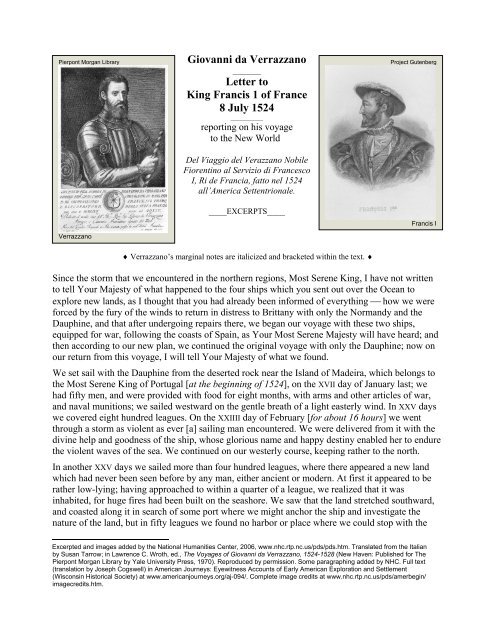
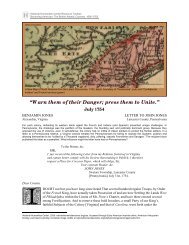
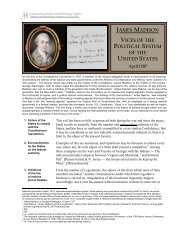
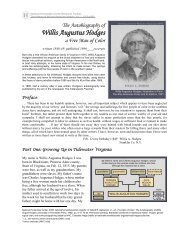
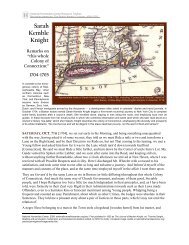
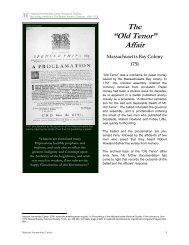
![The Requerimiento [Requirement], Council of Castile, 1510 ...](https://img.yumpu.com/21979685/1/190x245/the-requerimiento-requirement-council-of-castile-1510-.jpg?quality=85)
